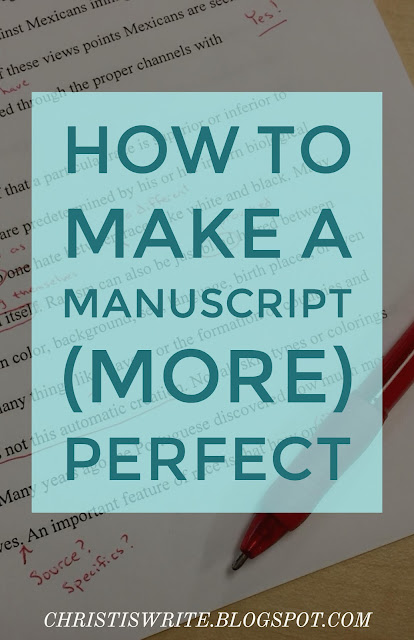KATIE CLARK started reading fantastical stories in grade school and her love for books never died. Today she reads in all genres; her only requirement is an awesome story! She writes inspirational romance for adults as well as young adult speculative fiction, including her YA supernatural novel, Shadowed Eden, and The Enslaved Series. You can connect with her at her website, on Facebook, or on Twitter.
How to Make a Manuscript (More) Perfect
Guest Post by Katie Clark
@KatieClarkBooks
Here’s an honest to goodness truth. The first novels I wrote were in high school. I think I wrote a total of…four? Maybe five. I never expected anyone to read them (and no one ever did read them!). I was writing only for my own pleasure.
Skip forward a few years, and I wrote a novel that I decided I wanted to share with the world. Only, I had a problem. I had no idea what to do with it once I’d written it. How could I make it better? How could I make it professional? I didn't know how to edit. Seriously. I tried and failed miserably.
I needed help! After asking around I received a few book recommendations on editing. I did some reading and figured out a better way to do things. Everyone has to find the process that works for them, but hopefully these tips can put you on the right path!
 |
| Pin It! |
1. I write first, edit later (after my manuscript is completed).
But sometimes as I’m writing I know that something is going to have to be changed. How do I know it? Because I might think of something I want to add, or take away, or I might come up with an idea I like better. Instead of scrapping everything I’ve already done, I make notes to myself and keep moving forward with my manuscript.
For instance, if I mention on page one that the main character graduated from the University of Alabama, but later I realize she needs to have attended college in Texas, I make a note right in the manuscript. I use a Word program so I can add “notes,” but whatever method you develop for yourself will work just as well.
Then, when I'm ready to begin editing, the first thing I do is go through and make all the big changes I've reminded myself to make in my notes. This works for big plot issues (foreshadowing the bad guy’s identity?) as well as smaller detail issues (like the color of your hero’s eyes). Warning—this process can take a while! Sometimes it will require some major rewriting, but you must be willing to do the hard stuff.
2. I go chapter by chapter.
When my big plot issues and small detail issues have been fixed, I start at chapter one. I go through it two or three (or ten) times, smoothing out each sentence and making sure I've said exactly what I want to say, at exactly the right time. Sometimes this has to do with rearranging paragraphs to make sure I’ve given proper details at the proper times (for instance, it’s a good practice to give a few brief details of new characters or settings when they’re first introduced…instead of three pages in when the readers have already had time to develop their own opinions on what someone looks like!). Other times it has to do with using exactly the right words to convey a specific feeling. When I'm pleased I move on to the next chapter.
3. I work on the beginning and the ending.
Once I've gotten my chapters in shape, I work on fine tuning my opening and ending to make sure they hook and then satisfy the reader as best as they can.
4. A final read through.
During this read through, I do two things. First, I check for spelling, punctuation, and grammar errors—this is very important if you want to look professional and be taken seriously! Second, I focus on making sure each word choice shines.
For instance, in one manuscript my main character owned a bakery, so I went through the manuscript and made a few changes to bring out her “baker’s” voice—I made changes like turning “I was so sad” into "I was so depressed I raided the baker's chocolate!” It really helped the writing pop.
What about you? Do you have anything special you do when it comes to your editing process? I'd love for you to share!
*What were those editing books recommended to Katie?
- Self-Editing for Fiction Writers by Renni Browne and Dave King
- Writing the Breakout Novel by Donald Maas
Tweetable:
How to Make a Manuscript (More) Perfect @KatieClarkBooks http://bit.ly/2r0G4Db #amediting #amwriting


Write first, edit later - definitely something that I always try to do! I once heard the advice "write your first draft with your heart, and then edit with your head", and I think it's important. It's easier to go with what just feels right during the first draft, and then be smart during the edits :D. Awesome post, Katie!
ReplyDelete(also, Tessa - I think I emailed you about doing a blog swap awhile back, but I never got a reply? Just wanted to know if it ever came through ;))
~ Savannah @ Scattered Scribblings
Thanks for having me, Tessa!
ReplyDelete